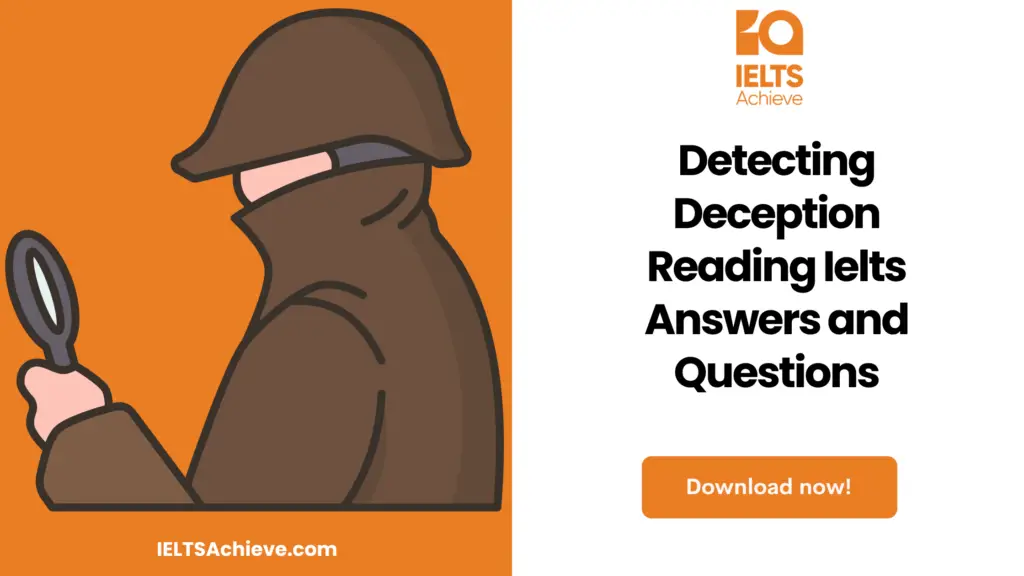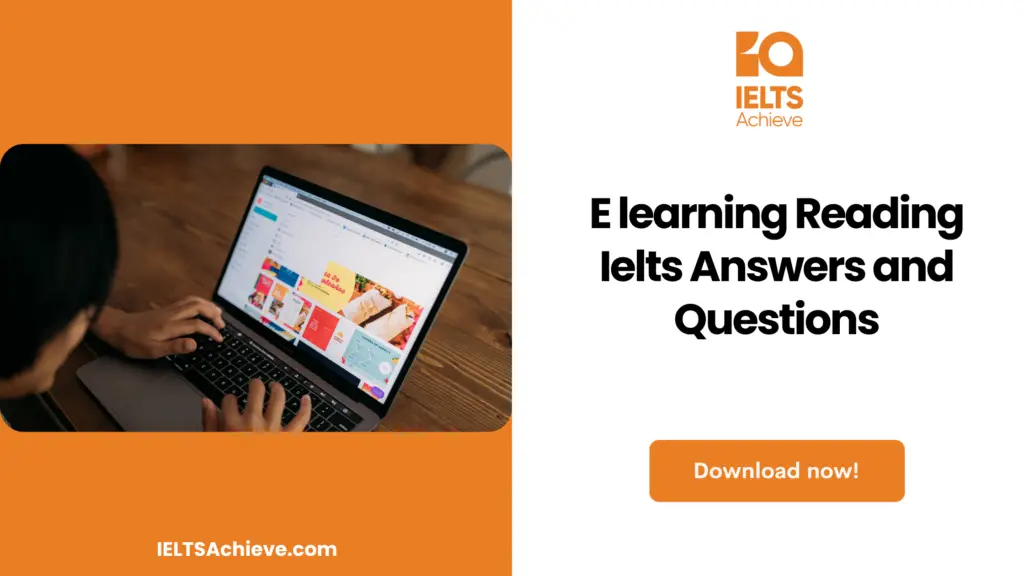The Blog post contains the following IELTS Reading Questions:
- IELTS Reading Yes No Not Given
- IELTS Reading Summary Completion
- IELTS Reading Sentence Completion
Stay informed and prepared for success – Explore our comprehensive Reading Test Info page to get valuable insights, exam format details, and expert tips for mastering the IELTS Reading section.
Detecting deception Reading Passage

Detecting Deception
There are three obvious tells that someone is fibbing, so the common belief goes. They include: talking too fast, having a voice that rises and falls too dramatically in pitch, getting tense and evasive when pressed for specifics, and avoiding eye contact. As you can see, that doesn’t seem to raise any eyebrows. A skilled liar, however, will be aware of these as the target of their deception, and will make sure that eye contact in particular is made. A person’s eyes may appear shifty if they are feeling emotionally affected by their lie or if they are nervous as a result of lying. Of course, this does not apply to situations where making eye contact is impractical, such as when speaking on the telephone. According to psychologist Paul Eckman, telling a falsehood with a lot of specifics might make it seem more plausible. Nonetheless, they are commonly used to expose a liar. Your suspicions should be raised if there are discrepancies or shifts in the information provided.
Emotional connections and convincing deception are inextricably linked. One theory is that it’s more difficult to lie to those we care about. This is due to the fact that our closest friends and family members are the most likely to pick up on our tells and habits of speech. The second is that we don’t have the same emotional reaction to lying from strangers as we do from close friends and family. The excellent liar doesn’t feel awful or have a guilty conscience, so it’s much harder to pick up on indications that they are lying, says Robert Galatzer-Levy, MD, a psychoanalyst in private practice. That’s why it looks like politicians and salespeople can just make anything up at will.
There has been a recent trend of politicians making ridiculous claims about their lie detection abilities. Many members of the general public reportedly think they have a decent sense of whether or not another individual is being truthful. Studies actually support the reverse.
Patricia Wallace, a deception expert and professor at the University of Maryland, has said, “Psychological research on deception shows that most of us are poor judges of truthfulness and this applies even to professionals such as police and customs inspectors whose jobs are supposed to include expertise at lie detection.” Next, she goes on to detail two of the many experiments found in the psychological research literature that back up her claim.
The first study of its kind was done in 1987, and it examined the videotapes’ to spot false claims made by eyewitnesses. Some of the witnesses were truthful, while others were not, and their remarks were played for the panel. They were drilled on the importance of seeing and responding to subtle alterations in a person’s body language, posture, gestures, and expressions. Students were also reminded to listen for changes in volume and pitch. Ultimately, however, the cops’ accuracy in detecting whether or not the witnesses were telling the truth was just slightly higher than chance. Also, the officer’s likelihood of being incorrect increased in proportion to the degree to which the officer relied on his or her own judgement.
Another study included both airline customs officials, whose duty it is to try to spot signs of suspicion and deception, and members of the general public. In this experiment, neither the inspectors nor the laypeople were given any guidelines on what they should look for. They were tasked to view videotapes with determining whether or not a traveller in a simulated inspection interview was telling the truth regarding the presence of illegal items in their luggage. In order to try and trick the inspectors, the “passengers” being interviewed were actually paid volunteers. Neither regular citizens nor professional inspectors fared significantly better than chance. When asked what indicators of deceit they looked for, inspectors and the general public generally relied on stereotypes about liars, such as the belief that they would provide brief responses, offer irrelevant details, avoid queries, and make shaky gestures.
Almost all previous deception experiments have shared the commonality of using videotape rather than actual human participants. You could make the case that politicians and others are making an effort to highlight this particular distinction. To put it another way, people can’t detect when someone is lying on camera, but they can when they’re face-to-face. It would be a stretch of reasoning to claim that a videotaped interview is lacking essential information without first conducting research to tease out these subtle differences.To all appearances, this is a wild guess. Videotaped interviews give the impression of being conducted in real time to the interviewers. It’s just a recording of the real thing. So, we can’t say for sure that there aren’t distinctions because we lack sufficient evidence to the contrary. Someone who claims to know without having such information is speaking out of ignorance or bias.
Results from this study are unmistakable. Neither educated experts nor untrained members of the public are capable of detecting dishonesty. It’s much easier to tell if someone is being honest if you’ve known them for a long time, but total strangers can’t do any better than chance when guessing if someone is telling the truth.
Unlock your full potential in the IELTS Reading section – Visit our IELTS Reading Practice Question Answer page now!
Recommended Questions:
Renewable Energy IELTS Reading Question with Answer
Detecting Deception IELTS Reading Questions
Questions 1-4
Are the following claims true based on what the passage says? Write
YES if the statement agrees with the information
NO if the statement contradicts the information
NOT GIVEN if there is no information on this
- Deceptive methods used by liars can backfire and reveal their deceit.
- Good liars don’t let their lies affect them emotionally.
- Authorities survived longer than airline customs officers in two studies stated in the text.
- Both experiments detailed in the text had extremely identical pre-experiment preparations.
Want to excel in identifying the writer’s views and claims? Click here to explore our in-depth guide on how to accurately determine Yes, No, or Not Given in the IELTS Reading section.
Questions 5 and 6
Complete the summary below.
For each response, choose NO MORE THAN TWO WORDS AND/OR A NUMBER from the passage.
A deception expert and professor at the University of Maryland, has stated, Psychological research on deception demonstrates that the majority of us are poor judges of 5.______________, and this applies even to professionals such as police and customs inspectors whose jobs require expertise in 6.______________.
Questions 7-13
Questions 7-13 ask you to use information from Reading Passage to complete various sentences.
Each question should have NO MORE THAN THREE WORDS of written response. Please fill out answer boxes 7-13.
7. Others have suggested that politicians use the difference between live and televised speech as a __________.
8. People’s expectations of liars are typically met because they are _________.
9. The two vocal signals that police officers were listening for in their experiment were __________..
10. Airline customs officials and the general public were allegedly fooled by _________.
11. Is there any other kind of communication in the text when individuals don’t make eye contact with one another (except television)?
12. Who among us has recently claimed to be able to detect dishonesty with ease?
13. Why do so many studies on the psychology of deception share commonalities?
Enhance your sentence completion skills in the IELTS Reading section. Click here to access our comprehensive guide and learn effective strategies for filling in missing words or phrases in sentences.
Unlock your full potential in the IELTS Reading section – Visit our IELTS Reading Practice Question Answer page now!
Recommended Questions:
Renewable Energy IELTS Reading Question with Answer
Detecting deception reading answers
1. Yes
2. Yes
3. Not Given
4. No
5. Truthful
6. Lie Detection
7. Subtle Differences
8. Aware of
9. Tempo and Pitch
10. Paid volunteers
11. Telephone Conversation
12. Politicians
13. Videotape

We hope you found this post useful in helping you to study for the IELTS Test. If you have any questions please let us know in the comments below or on the Facebook page.
The best way to keep up to date with posts like this is to like us on Facebook, then follow us on Instagram and Pinterest. If you need help preparing for the IELTS Test, join the IELTS Achieve Academy and see how we can assist you to achieve your desired band score. We offer an essay correction service, mock exams and online courses.

